Africa
Reaction in St. Peter’s Square to black smoke on first day of Conclave to elect new pope

The faithful and curious at St. Peter’s Square in Vatican City reacted to the “unique moment” of watching the smoke billow out from the Sistine Chapel.
Italian faithful Deborah Ruffalo said she “waited anxiously and with great anticipation” for the smoke that would signal whether a new pope had been elected or not to pour out of the chimney on Wednesday.
“We’re placing our hopes in tomorrow, which is also a Marian day, the feast of Our Lady of Pompeii, so surely a Pope under the sign of Mary in the month of May and tomorrow we hope to experience this unique moment here,” she said.
Outside in St. Peter’s Square, the scene was festive as thousands of people flocked to the piazza to watch the proceedings on giant video screens, applauding when the Sistine Chapel’s doors slammed shut and the voting began.
They waited for hours, watching screens that showed just a skinny chimney and occasional seagull. After the vote dragged on to dinnertime, some left in frustration, but those who stayed cheered when the smoke finally billowed out.
The cardinals were sequestered from the outside world Wednesday, their cellphones surrendered and airwaves around the Vatican jammed to prevent all communications until they find a new pope.
Francis named 108 of the 133 “princes of the church,” choosing many pastors in his image from far-flung countries like Mongolia, Sweden and Tonga that had never had a cardinal before.
His decision to surpass the usual limit of 120 cardinal electors has both lengthened the amount of time it takes for each vote to be processed and injected more uncertainty into a process that is always full of mystery and suspense.
Africa
Catholics in Ivory Coast happy with election of new Pope Leo XIV
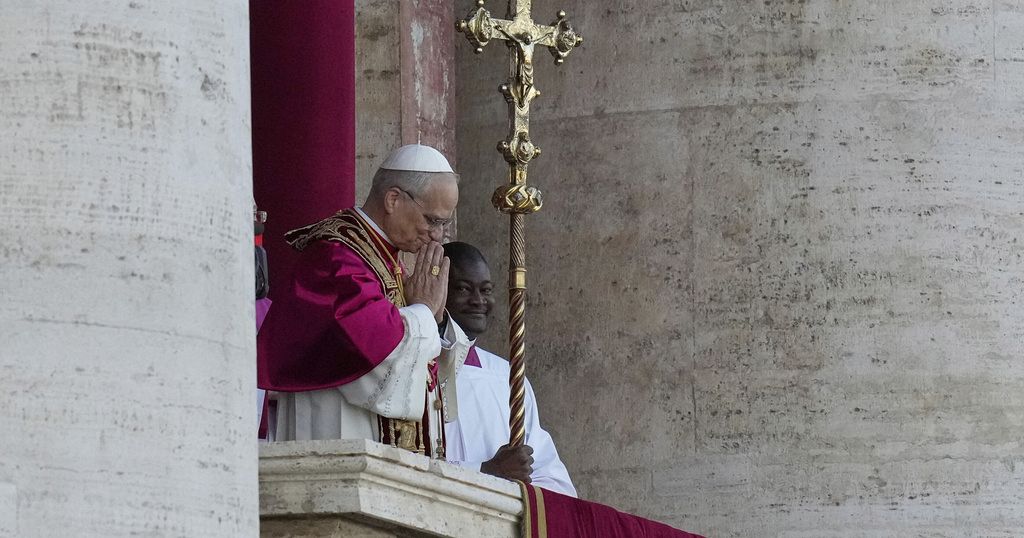
Catholics in Ivory Coast say they are happy with new Pope Leo XIV despite hopes of an African pope being elected.
At St John’s Catholic Church in Abidjan, the faithful gathered on Thursday evening to pray for the ongoing conclave.
During the service, American Robert Prevost was named Pope Leo XIV, making him the first pope from the United States in the 2,000-year history of the church.
“We are very happy here in Ivory Coast, and we pray for the new pope, Pope Leo XIV,” said Hervé Djezou Konan, a priest who serves as head of communications for the Catholic Church in Ivory Coast.
Catholic faithful, Clementin Zongo, who attended the service, said she was grateful that the conclave had concluded.
“All I hope is that this new pope we’ve been given will be a model pastor, and that the Holy Spirit will always be with him in his discernment and decision-making,” she said.
As Catholicism declines in Europe, it is expanding in the developing world, with the number of faithful growing faster in Africa than anywhere else.
There were a few African cardinals considered to be in the running to become pope. At least 20% of the global Catholic community lives in Africa.
Africa
US to cut $50 million health aid to Zambia because of medicine theft

The United States said on Thursday that it will cut $50 million in annual aid to Zambia because of what it described as the “systemic theft” of donated drugs and medical supplies.
Washington’s ambassador to the country, Michael Gonzales, said the “difficult” decision comes after repeated warnings to the government to safeguard the vital medicines.
These included life-saving drugs to treat malaria, HIV, and tuberculosis.
He said the US discovered in 2021 that medicine and medical supplies that were meant to be provided free to Zambians were being taken and sold by pharmacies across country.
An investigation of around 2,000 pharmacies in Zambia between 2021 and 2023 found that nearly half of them were selling medicines and products paid for by US aid funds.
Gonzales said the Zambian government failed to do enough to address the corruption after being informed of the theft scandal last year.
He said the US was no longer willing to “underwrite the personal enrichment of fraudsters” with American taxpayers money.
The embassy in Zambia said it accounts for about a third of public health spending in the country.
There was no immediate comment on Thursday from the Zambian government.
The cuts are separate from a broader review of foreign aid spend by President Donald Trump’s administration.
Gonzales said he had recommended that the US start cutting the aid from January next year to give Zambia time to plan new procurements of the life-saving drugs.
Africa
Algeria commemorates thousands killed by French troops in 1945 massacres

As Europe celebrates the 80th anniversary of its triumph over fascism and the end of World War II, Algeria is remembering a darker anniversary: the colonial-era massacres that erupted the same day.
In ceremonies in Guelma, Kherrata and Setif, the cities where the massacres took place, Algerians paid homage to those who were killed.
In a message this week, President Abdelmadjid Tebboune framed the event as a matter of national pride and prelude to the country’s fight for independence after 132 years of French colonialism.
Algeria’s ministry of war veterans is marking the anniversary with a series of events under the slogan, “A people without memory is a people without a future.”
The fight for independence
More than 500,000 tirailleurs (light infantry) from North Africa, West Africa, and Madagascar fought for France during World War II. Some volunteered. Others were forcibly conscripted. Many, including more than 100,000 Algerian tirailleurs, hoped their sacrifices would secure them greater rights.
But when the war ended, Algerians who dared to demand them were met with repression and violence, even as then-Gen. Charles De Gaulle exalted how “the cause of liberty and justice” had prevailed in a radio broadcast throughout France and its colonies, including Algeria.
On May 8, 1945, Algerians filled city streets in Ain Temouchent, Guelma, Kherrata and Setif, waving flags and reviving pre-war calls for independence. Protesters were met with police fire. Violent anti-French riots broke out, killing more than 100.
France subsequently launched an air and ground offensive that killed thousands of Algerians — 45,000 according to Algerian authorities and around 3,000 according to French statistics.
No official apology from France
Tebboune and French President Emmanuel Macron announced a truth commission-style “dossier de memoire” in 2022, led by a committee of historians from both countries. Yet, its activities have stalled amid deteriorating relations over issues such as immigration and how France juggles ties between Algeria and its regional rival Morocco.
Daho Djerbal, an Algerian historian who has written extensively on the events of May 8, 1945 and interviewed many survivors, said that day was a turning point in the country’s history when Algerians began to seek independence.
And, he said, France “has never acknowledged that they committed a mass murder. That’s the current term; we can call it a crime against humanity or a war crime. There was no declared war against the Algerian people. And we sent the air force, the navy, and field artillery to suppress a demonstration.”
French leaders, including Macron, have called for truth and recognition but stopped short of fulfilling Algeria’s demands for a formal state apology.
A delegation of around 30 French lawmakers from left and centrist parties arrived in Algiers on Wednesday to participate in the commemorations of the massacres.
-

 Middle East2 days ago
Middle East2 days agoWhat does the truce between the Houthis and the US mean for Yemenis? | Houthis
-
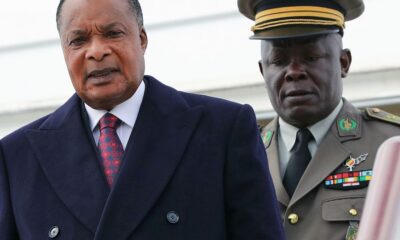
 Africa2 days ago
Africa2 days agoForeign leaders arrive in Russia for Victory Day parade
-
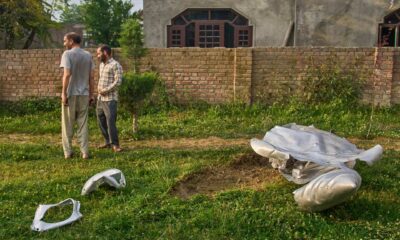
 Conflict Zones2 days ago
Conflict Zones2 days agoInformation war: Are India or Pakistan telling the truth about attacks? | India-Pakistan Tensions News
-
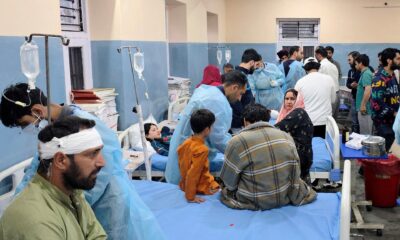
 Conflict Zones1 day ago
Conflict Zones1 day ago‘Don’t want war’: Kashmiri towns caught in deadly India-Pakistan crossfire | India-Pakistan Tensions
-
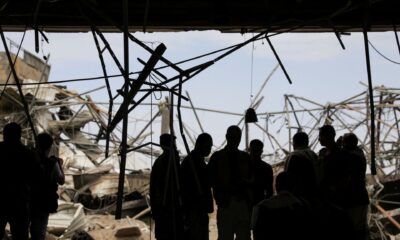
 Middle East1 day ago
Middle East1 day agoThe Take: What does Israel’s escalation with the Houthis mean for Yemen? | Houthis News
-

 Europe2 days ago
Europe2 days agoKylie Jenner and Timothée Chalamet make their red carpet debut in Rome
-

 Africa2 days ago
Africa2 days agoKenya sentences four men for trying to smuggle ants out of the country
-

 Education23 hours ago
Education23 hours agoThe best and brightest young scientists are looking beyond the U.S. as cuts hit home




